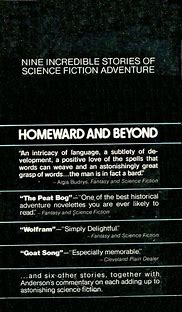"...though I knew he believed in no gods - merely in that dance of blind atoms which Lucretius has written of - and acted pious lest he raise superstitious fears." (Anderson, Homeward And Beyond, New York, 1976, p. 195)
Lucretius denied not the gods' existence but their control of nature and intervention in human affairs. Composed of finer atoms than animals or human beings, they are sometimes perceived in dreams. Thus, they fit into his materialist philosophy but not as popularly conceived.
A single atom is not "blind," like an animal without eyes, but pre- or sub-organic. Animal, human and divine combinations of atoms see because their eyes register images transmitted by atoms of light.
The narrator, Philon, a Greek freedman, calls on Aphrodite. He thinks that Memmius:
"... is doubtless right about the absurdity of the myths, very possibly most of the world arises from a play of forces and nothing else; but She is. I have felt Her too often to imagine otherwise." (pp. 195-196)
Again, Anderson recognizes the strength of Pagan religious experience although he does not in this passage tell us how Philon has felt the Goddess.

No comments:
Post a Comment